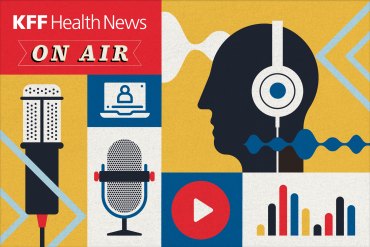Gobierno prometió “transparencia radical”, pero oculta solicitudes de fondos para la salud rural
Drones que entregan medicamentos y telesalud en bibliotecas locales son algunas de las ideas que líderes estatales acaban de presentar para gastar su parte de un programa federal de salud rural de $50.000 millones.
New Work Requirement Adds Red Tape to Missouri’s Snarled Food Aid System
Under Republicans’ One Big Beautiful Bill Act, states must shoulder more of the administrative and cost burdens of the food aid program SNAP, which helps feed 42 million Americans.
Investigadores de salud pública temen que las tasas de vacunación caigan aún más, especialmente entre latinos, afroamericanos y personas menores de 30 años
Caída de las tasas de vacunación y de la inmunidad alimentan brotes de tos convulsa
Texas registró 1.928 casos de tos convulsa en 2024. Para octubre de 2025, el estado ya superaba los 3.500. A nivel nacional, las cifras son igual de alarmantes.
Kennedy Sharpens Vaccine Attacks, Without Scientific Backing
HHS Secretary Robert F. Kennedy Jr. claims that the aluminum ingredients in vaccines cause a variety of harmful reactions, from allergies to autism. Scientists say that’s wrong and warn of risks if they’re removed. Here are some of the basics.
Una crisis de salud oculta tras los desastres naturales: la proliferación de moho en los hogares
Se estima que el 47% de los edificios residenciales de Estados Unidos tiene humedad o moho. Así que, aunque la última temporada de huracanes esté por terminar, siguen presentes los problemas de salud asociados al moho.
The Covid Contrarian Clubhouse Makes Its Mark on Trump’s Washington
Get our weekly newsletter, The Week in Brief, featuring a roundup of our original coverage, Fridays at 2 p.m. ET.
What To Know About the CDC’s Baseless New Guidance on Autism
A reshaped CDC website suggesting that vaccines cause autism has appalled the medical community.
Cancer Stole Her Voice. She Used AI, Curse Words, and Kids’ Books To Get It Back.
After a total glossectomy and laryngectomy to treat her cancer, Sonya Sotinsky can no longer speak. She searched for a way to sound like herself again and now pays out-of-pocket for an artificial intelligence app that can replicate her old voice — emotion, inflection, and all.
Cáncer de mama y anticonceptivos: un nuevo estudio revela cómo se puede distorsionar la ciencia
Mientras la desinformación sobre la salud de las mujeres se propaga más rápido que nunca, médicos dicen que una nueva investigación pone en evidencia los desafíos de comunicar con matices en la era de las redes sociales.
Waning Immunity and Falling Vaccination Rates Fuel Pertussis Outbreaks
New details from health officials suggest the whooping-cough surge may be part of a national pattern driven by slipping vaccine coverage and waning immunity, with infants bearing the brunt of the consequences.
Help Us Investigate Medical Care for Gunshot Wounds
We’d like to talk to people who’ve been wounded or families of those killed by gun violence to better understand how insurance affects such medical care.
A Small Texas Think Tank Cultivated Covid Dissidents. Now They’re Running US Health Policy.
Fueled by covid backlash, a libertarian author created the Brownstone Institute in 2021. In recent months, people with ties to the group have catapulted to the highest levels of U.S. government, exercising significant authority over access to vaccines and scientific research.
A Hidden Health Crisis Following Natural Disasters: Mold Growth in Homes
As extreme weather wreaks havoc, the risk of dangerous mold looms. An estimated 47% of homes already have mold or dampness, leaving their residents exposed to mold spores and associated allergens that can cause respiratory problems.
Journalists Untangle Issues of Health Care Costs and Food Benefits
KFF Health News journalists made the rounds on national or local media recently to discuss topical stories. Here’s a collection of their appearances.
Represión de Trump empuja a inmigrantes víctimas de violencia doméstica a las sombras
Además de ser más vulnerables a la violencia sexual, los inmigrantes enfrentan múltiples desafíos de salud física y mental, según los investigadores.
Conflicting Advice on Covid Shots Likely To Ding Already Low Vaccine Rates, Experts Warn
About 1 in 4 American adults got a covid vaccine shot during the 2024-25 virus season, a fraction health care experts warn could be smaller this year as millions wrestle with conflicting advice from the government and trusted medical organizations about the value of a shot.
ICE Crackdown Heightens Barriers for Immigrant Domestic Violence Victims
Immigrant victims of domestic violence have long encountered hurdles when seeking help from police and courts. The Trump administration’s immigration crackdown has made victims without legal status even more afraid to report abuse, advocacy groups say.
Lo que el aire que respiras le puede estar haciendo a tu cerebro
En 2020, la influyente Comisión Lancet incluyó la contaminación del aire en su lista de factores de riesgo modificables para la demencia.
Wielding Obscure Budget Tools, Trump’s ‘Reaper’ Vought Sows Turmoil in Public Health
Through shrouded bureaucratic maneuvers, White House budget director Russell Vought and DOGE have quietly upended outbreak response, HIV treatment, and dementia care in communities across America.
























